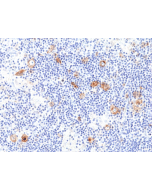Cookie Policy: This site uses cookies to improve your experience. You can find out more about our use of cookies in our Privacy Policy. By continuing to browse this site you agree to our use of cookies.
AdipoGen Life Sciences
anti-CD30 (human), mAb (rec.) (SH313-B5)

| Product Details | |
|---|---|
| Synonyms | CD30L Receptor; Ki-1 Antigen; Tumor Necrosis Factor Receptor Superfamily Member 8; TNFRSF8 |
| Product Type | Recombinant Antibody |
| Properties | |
| Clone | SH313-B5 |
| Isotype | Human IgG1 |
| Source/Host | Produced without the use of animals. Purified from HEK 293 cell culture supernatant. |
| Immunogen/Antigen | Recombinant human CD30 containing a C-terminal human Fc-tag. |
| Application |
FUNC: Agonistic CD30 antibody that shows CD30L-like activities, as it inhibits the amplification of CD30+ Karpas 299 cells in a similar fashion as soluble CD30L [References 1 & 3]. |
| Crossreactivity | Human |
| Specificity |
Recognizes human CD30. |
| Purity | ≥95% (SDS-PAGE) |
| Purity Detail | Protein A purified from animal component-free supernatant. |
| Concentration | Lot dependent. |
| Formulation | Liquid. In PBS. |
| Isotype Negative Control | |
| Other Product Data |
This is an antibody developed by antibody phage display technology using a human naive antibody gene library. These libraries consist of scFv (single chain fragment variable) composed of VH (variable domain of the human immunoglobulin heavy chain) and VL (variable domain of the human immunoglobulin light chain) connected by a polypeptide linker. The antibody fragments are displayed on the surface of filamentous bacteriophage (M13). This scFv was selected by affinity selection on antigen in a process termed panning. Multiple rounds of panning are performed to enrich for antigen-specific scFv-phage. Monoclonal antibodies are subsequently identified by screening after each round of selection. The selected monoclonal scFv is cloned into an appropriate vector containing a Fc portion of interest and then produced in mammalian cells to generate an IgG like scFv-Fc fusion protein. |
| Accession Number | P28908 |
| Declaration | Manufactured by Abcalis |
| Shipping and Handling | |
| Shipping | BLUE ICE |
| Short Term Storage | +4°C |
| Long Term Storage | -20°C |
| Handling Advice |
After opening, prepare aliquots and store at -20°C. Avoid freeze/thaw cycles. Please handle under sterile conditions to avoid contamination. |
| Use/Stability |
Stable for at least 1 year after receipt when stored at -20°C. Stable for at least 1 week when stored at +4°C. |
| Documents | |
| MSDS |
 Download PDF Download PDF |
| Product Specification Sheet | |
| Datasheet |
 Download PDF Download PDF |
CD30 (Ki-1; TNF Receptor Superfamily Member 8) is a type I transmembrane glycoprotein of the TNF receptor superfamily. CD30 was originally identified as a cell surface antigen of Hodgkins and Reed-Sternberg cells using monoclonal antibody Ki-1. The ligand for CD30 is CD30L (CD153). The binding of CD30 to CD30L mediates pleiotropic effects including cell proliferation, activation, differentiation and apoptotic cell death. CD30 has a critical role in the pathophysiology of Hodgkin's disease and other CD30+ lymphomas. CD30 acts as a costimulatory molecule in thymic negative selection. In addition to its expression on Hodgkin's and Reed-Sternberg cells, CD30 is also found in some non-Hodgkin's lymphomas (including Burkitt's lymphomas), virus-infected T and B cells, and on normal T and B cells after activation. In T cells, CD30 expression is present on a subset of T cells that produce Th2-type cytokines and on CD4+/CD8+ thymocytes that co-express CD45RO and the IL4 receptor. Soluble form of CD30 (sCD30) serves as a marker reflecting Th2 immune response. TRAF2 and TRAF5 can interact with this receptor, and mediate the signal transduction that leads to the activation of NF-κB. CD30 is a positive regulator of apoptosis, and has been shown to limit the proliferative potential of autoreactive CD8 effector T cells and protect the body against autoimmunity.
- Human antibodies targeting CD30(+) lymphomas: X. Wezler, et al.; Hum. Antibod. 21, 13 (2012)
- Antibody fusion proteins with human ribonucleases 1 to 8: X. Wezler, et al.; Hum. Antibod. 26, 177 (2018)
- Blocking CD30 on T Cells by a Dual Specific CAR for CD30 and Colon Cancer Antigens Improves the CAR T Cell Response against CD30 - Tumors: A.A. Hombach, et al.; Mol. Ther. 27, 1825 (2019)







